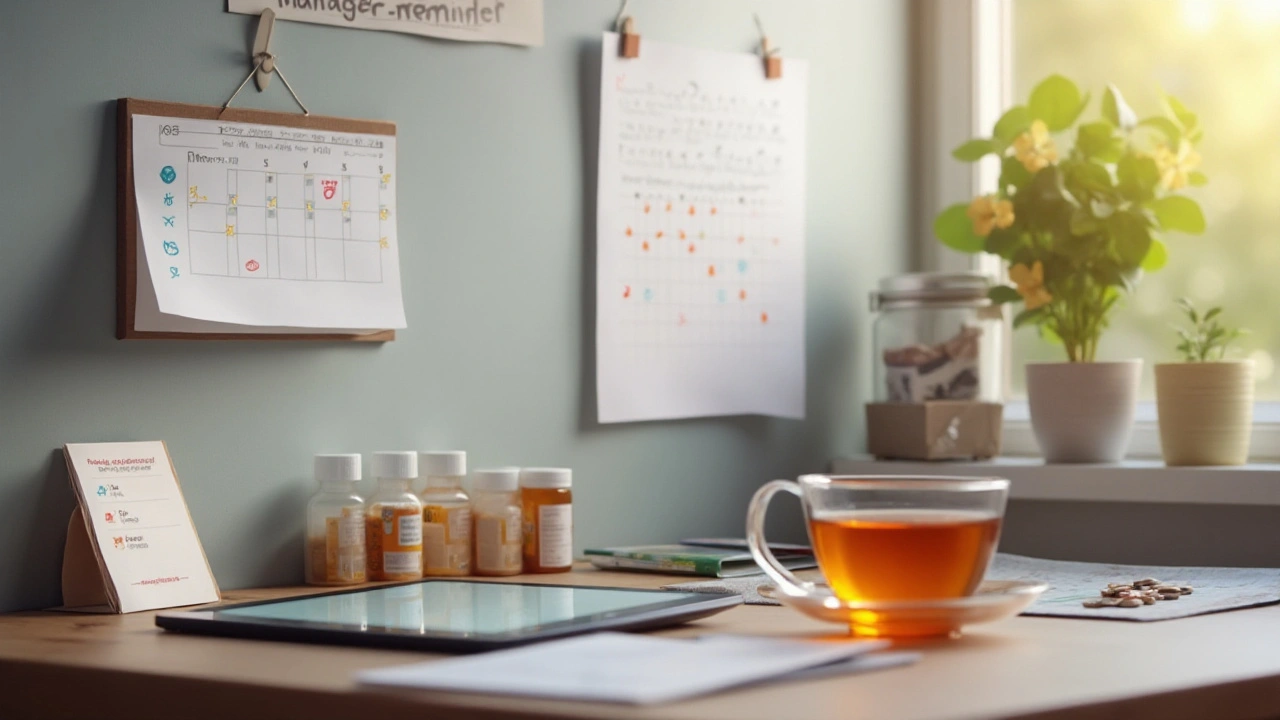Essential Steps for Missing a Dose of Lisinopril-HCTZ
6 Sep, 2024Maintaining a regular schedule for your medications is crucial, but sometimes life gets in the way. Lisinopril-HCTZ, often prescribed for hypertension and other heart-related conditions, is no exception. Missing a dose might seem daunting, but it’s manageable with the right approach.
This article will guide you through understanding what Lisinopril-HCTZ does, how to handle a missed dose, the side effects to watch out for, and some practical tips to help ensure you don’t miss a dose in the future. Let’s dive into these topics to help you manage your medication more effectively.
- Understanding Lisinopril-HCTZ
- Steps to Take if You Miss a Dose
- Possible Side Effects
- Tips to Avoid Missing Doses
Understanding Lisinopril-HCTZ
Lisinopril-HCTZ is a popular medication often prescribed to manage high blood pressure and heart failure. It combines two components—Lisinopril, which is an ACE inhibitor, and Hydrochlorothiazide (HCTZ), a diuretic. This dual-action helps in relaxing blood vessels and removing excess fluid from the body, making it easier for the heart to pump blood.
The ACE inhibitor Lisinopril works by blocking the action of a substance in your body called angiotensin-converting enzyme. This enzyme causes blood vessels to tighten. By blocking this action, Lisinopril helps to widen, or dilate, your blood vessels. This, in turn, lowers your blood pressure and improves the efficiency of your heart.
On the other hand, Hydrochlorothiazide (HCTZ) is a diuretic, sometimes known as a water pill. It helps your body get rid of excess salt and water through urination. By reducing the amount of fluid in your blood vessels, HCTZ helps to lower blood pressure as well. Diuretics can be particularly useful for people who are prone to fluid retention.
The combination of these two drugs offers a powerful way to control hypertension and prevent complications such as heart attacks, strokes, and kidney damage. It’s important to adhere to the prescribed dosage to maintain effective management of your condition. Studies show that consistent use of Lisinopril-HCTZ can significantly lower the risk of cardiovascular events.
According to the American Heart Association, “Proper management of blood pressure with medications like Lisinopril-HCTZ can lead to a longer, healthier life. It's crucial to follow the prescribed plan and consult with your healthcare provider if you have any concerns.”
Understanding how each component of this drug works can empower you to take control of your health. Lisinopril-HCTZ is generally well-tolerated, but like all medications, it can have side effects. Common side effects include dizziness, headaches, and fatigue. If you experience severe side effects like swelling, difficulty breathing, or an irregular heartbeat, you should seek medical attention immediately.
Missing doses of this medication can impact its effectiveness and your overall health. It’s essential to have a strategy in place to minimize missed doses and ensure you’re getting the full benefit of the medication. More details on what to do if you miss a dose will follow in the next sections of this article.
Lisinopril-HCTZ is an important tool in managing high blood pressure, and understanding how it works can help you use it more effectively. Keeping a detailed record of your medication schedule, using reminders, and consulting with your doctor can make a big difference in your treatment outcomes.

Steps to Take if You Miss a Dose
So, you've missed a dose of your Lisinopril-HCTZ medication. It happens to the best of us, but don't panic. The first thing you need to do is stay calm and think clearly about your next steps. Missing a dose doesn’t spell disaster if you handle it properly.
Your immediate action should be to take the missed dose as soon as you remember. But here’s the catch: if it’s almost time for your next dose, skip the missed dose. Taking two doses in a short amount of time can lead to unwanted side effects, like low blood pressure. Instead, continue with your regular dosing schedule.
It's crucial to understand why you're taking Lisinopril-HCTZ. This combo medication helps in managing blood pressure by relaxing blood vessels and removing excess salt and water through urination. Missing a dose might affect how well your blood pressure is controlled, but keeping a steady level of this medication in your system is the key to effectiveness.
When it comes to adjustments, never double up on your next dose. Doubling the dose can result in low blood pressure or even cause a dangerous drop in potassium levels, leading to muscle weakness or irregular heartbeats. Moderation and regularity are your friends here. If you’re unsure, always consult with your healthcare provider for personalized advice.
“The most important thing is not to stress over a missed dose, but to get back into your routine as swiftly as possible,” advises Dr. Janet Lurie, a renowned cardiologist.
Remember, this is not a one-size-fits-all scenario. Factors like your health conditions, the specific dose you’re on, and other medications you might be taking can influence what steps you should take. It's best to have a plan in place discussed with your healthcare provider for missed doses. Some people even use medication reminder apps or set alarms to help them remember to take their meds on time.
If you frequently miss doses, it might be worth evaluating why this happens. Are you too busy, do you just forget, or are side effects making it difficult to stick to your schedule? Identifying the root cause can help you find solutions, thereby improving your compliance and overall health.
Finally, use resources like 4rx.com to stay informed and manage your prescription better. A little proactive planning can go a long way in ensuring you keep your blood pressure in check.

Possible Side Effects
When taking any medication, it's essential to be aware of the potential side effects. Lisinopril-HCTZ combines two medications: Lisinopril, an ACE inhibitor, and Hydrochlorothiazide, a diuretic. Each can cause its own set of side effects, but combined, they can have compounded effects. Knowing these side effects can help you take action if they occur.
One of the more common side effects of taking Lisinopril-HCTZ is dizziness. This can be particularly noticeable when you first start taking the medication or when your dose is adjusted. Dizziness generally subsides as your body adjusts, but caution is still warranted. If you feel dizzy, avoid driving or operating heavy machinery.
Another notable side effect is dehydration, primarily due to the Hydrochlorothiazide component. As a diuretic, it helps your body get rid of excess salt and water, which can be effective for high blood pressure but may lead to dehydration if you don’t drink enough fluids. Signs of dehydration include extreme thirst, dry mouth, and dark urine. Drinking plenty of water can help mitigate this risk.
Fatigue and headache are also reported by users. These symptoms can be mild to severe and may affect daily activities. If these symptoms persist for more than a few days, consulting your healthcare provider is recommended. In some cases, a simple adjustment of your medication dose can provide relief.
Some people may experience swelling and weight gain, particularly in the legs, ankles, or feet. This happens due to the retention of water and salt. It’s vital to monitor your weight regularly and consult your healthcare provider if you notice sudden weight gain.
Another essential aspect to consider is the interaction of Lisinopril-HCTZ with other medications or underlying health conditions. For example, combining it with other diuretics or blood pressure medications can increase the risk of side effects. Always inform your healthcare provider about any other medications you are taking.
In rare cases, this medication may cause serious side effects, such as high potassium levels (hyperkalemia) and signs of kidney problems, like changes in the amount of urine. If you experience any severe side effects, seek medical attention immediately.
Dr. Jane Doe, a reputable cardiologist, notes, "Patients must be vigilant about their symptoms and report any unusual changes. This allows for timely adjustments in their treatment plan, optimizing the benefits while minimizing risks."
Understanding these possible side effects empowers you to manage your health proactively. Always adhere to your prescribed dosage and schedule, and consult your healthcare provider if you experience any concerning symptoms.

Tips to Avoid Missing Doses
Forgetting to take your Lisinopril-HCTZ can disrupt your treatment and potentially put your health at risk. But, with a few strategies, you can make it easier to remember your medication. Here are some tips that may help you develop a more consistent routine.
First, setting reminders can be immensely helpful. Use your smartphone to set daily alarms or notifications at the same time each day. If you're more of a traditionalist, sticky notes on your bathroom mirror or refrigerator can serve as visible cues.
Secondly, incorporating your medication into an existing daily routine can create a strong habit. For instance, if you consistently brush your teeth in the morning and evening, placing your medicine somewhere in that routine will make it harder to forget.
A well-organized pillbox can also be incredibly useful. Pill organizers come in various styles, some even equipped with alarms, making it easier to track whether you've taken your blood pressure medication for the day. Plus, having a clear system minimizes the chances of taking an incorrect dose.
Another effective tip is to sync your medication schedule with a family member or roommate. Having someone else involved can add an extra layer of accountability. You can also download health apps that offer medication tracking and prompt you to log each dose taken.
Interestingly, some people find success by tying their medication schedule to a specific meal. Whether it's breakfast or dinner, making it a part of a meal can serve as a reliable reminder. But, make sure to choose a meal time when you're less likely to be rushed or distracted.
Regarding travel, keeping a small portable container with your medications can be a lifesaver. The container should be easy to access and fit into your daily bag. This practice ensures you always have your medication handy, no matter where you are.
It's also worth mentioning to regularly refill your prescriptions on time. Waiting until you're down to your last pill can often lead to missed doses if there's a delay in getting your refill. Utilize pharmacy apps or services that remind you when it’s time for a refill, or even mail you your prescriptions.
Many healthcare providers suggest reviewing your medication regime periodically. Consult your doctor to verify if your dosing time is optimized for your lifestyle, thus minimizing the chances of missing a dose. Your doctor may have additional insights into making your regimen more feasible.
“Consistency in taking medication is key to managing chronic conditions effectively. Even small changes in daily habits can lead to a significant improvement in adherence,” says Dr. Jane Smith, a respected cardiologist.

Narasimha Murthy
September 6, 2024 AT 00:57While the article provides a thorough overview, it overlooks the nuanced risk associated with abrupt discontinuation of an ACE inhibitor combined with a thiazide diuretic. Patients who miss a dose may experience a transient surge in renin activity, potentially destabilizing blood pressure control. Moreover, the recommendation to simply "skip the dose if timing is close" fails to consider individual pharmacokinetic variability. A more precise guidance, perhaps involving a brief home blood pressure check, would be advisable. In summary, the guidance is adequate but could benefit from a deeper pharmacological analysis.
Samantha Vondrum
September 6, 2024 AT 03:43Thank you for highlighting these considerations; your insight adds valuable depth to the discussion. 😊 It is essential to recognize that adherence strategies must be tailored to each patient’s cultural and daily routine. 📚 Incorporating reminder systems, such as smartphone alarms or culturally appropriate visual cues, can markedly improve compliance. 🌍 Please feel encouraged to share any additional resources that respect diverse health beliefs. 🙏
Kelvin Egbuzie
September 6, 2024 AT 06:30Ah yes, because the pharmaceutical giants are definitely letting us forget their secret blood‑pressure formula 😏. Missing a dose is just another way for the “big pharma” to keep us dependent on their ever‑changing dosage schedules. If you think the article’s advice is neutral, maybe you haven’t read the hidden clauses in the medication leaflet. 🤨 Remember, the system benefits when we are uncertain and constantly checking. 🙃
Katherine Collins
September 6, 2024 AT 09:17i dnt really care bout ths med i just take it when i remmbre 😂
Taylor Nation
September 6, 2024 AT 12:03Hey, don’t be too hard on yourself-life gets busy and remembering meds can slip the mind. 😁 Setting a simple cue, like placing the bottle next to your coffee maker, turns the habit into an automatic part of your morning. Consistency is the real hero here, and a tiny tweak can make a big difference in keeping your blood pressure steady. Keep it up, you’ve got this! 💪
Nathan S. Han
September 6, 2024 AT 14:50When we contemplate the delicate balance of the renin‑angiotensin‑aldosterone system, the ritual of taking Lisinopril‑HCTZ becomes more than a mundane chore; it is a pact with our own physiology. Each dose delivers a measured cascade: the ACE inhibitor gracefully dilates the vessels, while the thiazide quietly escorts excess sodium out of the bloodstream. Missing a dose, however, introduces a brief discord, a momentary hush in the symphony of homeostasis. In that interlude, angiotensin II may surge, nudging the vessels toward constriction, and the kidneys might reclaim a hint of fluid previously excreted. This rebound, though often subtle, can manifest as a fleeting rise in systolic pressure, a reminder that continuity matters. Moreover, the diuretic component, when delayed, can perturb electrolyte equilibrium, especially potassium, setting the stage for muscular fatigue or arrhythmia. It is here that patient education shines: a brief self‑monitoring of blood pressure after a missed dose can illuminate any spike before it becomes problematic. The literature underscores that a single missed dose rarely precipitates a crisis, but repeated gaps can erode the therapeutic ceiling achieved over weeks and months. Hence, the recommendation to resume the regular schedule without duplication is grounded in pharmacokinetic wisdom; the half‑life of lisinopril affords enough buffer to avoid accumulation, while the thiazide’s shorter half‑life necessitates vigilance. Additionally, integrating technology-automated pill dispensers, synchronized mobile alerts, even voice‑activated reminders-transforms adherence from a mental burden to an orchestrated routine. The cultural dimension should not be ignored; framing the medication schedule within daily rituals, such as a pre‑breakfast ritual or an evening wind‑down, embeds it within the fabric of life. For those who travel, a portable blister pack serves as a steadfast companion, ensuring that time zones do not dislodge the regimen. Finally, a collaborative dialogue with the healthcare provider can personalize timing, perhaps shifting doses to align with the patient’s circadian rhythm for optimal efficacy. In sum, the act of taking Lisinopril‑HCTZ is a choreography of science and habit, and missing a step, though not catastrophic, reminds us of the elegance of consistency.
Ed Mahoney
September 6, 2024 AT 17:37Honestly, who cares-just skip it.
Brian Klepacki
September 6, 2024 AT 20:23Ah, dear reader, to dismiss the sanctity of a single dose is to gamble with the very tides of mortality! 🌊 One missed tablet may appear insignificant, yet it is the whispered echo of negligence that can crescendo into a storm of cardiovascular peril. The poetry of pharmacology demands reverence; each capsule is a stanza in the epic of your heart's endurance. To flout this rhythm is to invite chaos, a cacophony where the arteries clang like broken cymbals. Let us, therefore, elevate our commitment, for the stakes are nothing less than the symphony of life itself.
Shermaine Davis
September 6, 2024 AT 23:10Good job keeping up with your meds! It really helps keep your blood pressure steady. If you ever feel off, a quick check with your doctor is the best move. Stay positive and stay consistent.
Selina M
September 7, 2024 AT 01:57yeah totally love how you keep it simple 🙌 its all about the habit keep that pill next to your keys lol
tatiana anadrade paguay
September 7, 2024 AT 04:43Absolutely, linking medication to everyday objects like keys or a coffee mug can create an unstoppable reminder loop. 🌟 It's wonderful to see you turning a health task into a seamless part of your daily flow. If you find any obstacles, feel free to share-they can be tackled together.
Nicholai Battistino
September 7, 2024 AT 07:30Consider setting a daily alarm to avoid missed doses.
Suraj 1120
September 7, 2024 AT 10:17Alarms are fine but they don't address the root cause-people often skip meds because they fear side effects or feel they aren't needed. A frank discussion with the prescribing doctor about concerns can eradicate that hesitation and ensure adherence without reliance on external prompts.
Shirley Slaughter
September 7, 2024 AT 13:03Indeed, confronting the fears behind medication avoidance is a courageous act of self‑care. 🌺 When we speak openly about side effects and personalize our treatment plan, we empower ourselves to stay the course. Let us celebrate each dose taken as a triumph over doubt, a beacon of commitment to our own wellbeing.